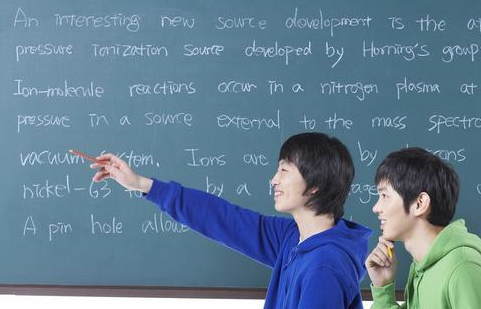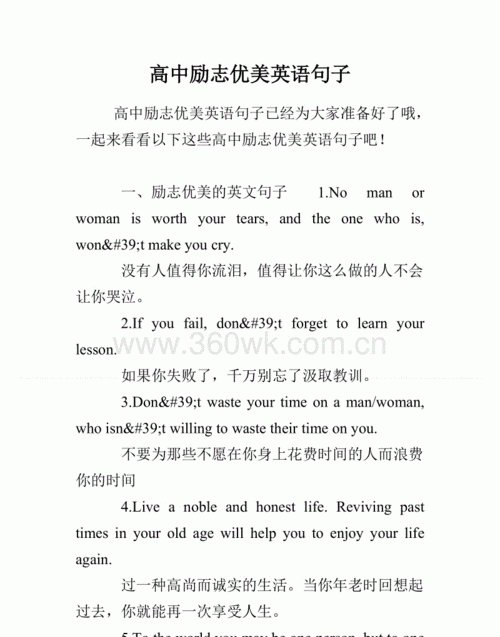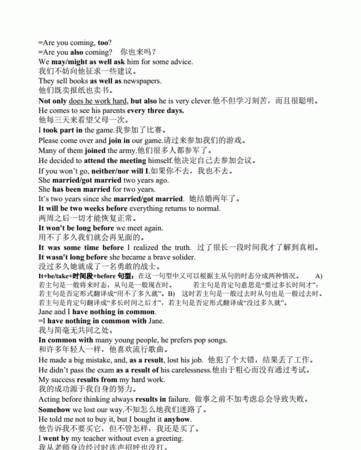本文目录
高中英语作文万能高级句子
高中英语作文重点句子:
1、Meeting my uncle after all these years was an unforgettable moment, one I’ll always treasure.
多年之后见到叔叔是一次难忘的时刻,一次我永远珍惜的时刻。
2、He was a strict but good captain, one who, unusually, took good care of the sailors on his ship.
他是一个既严厉又善良的船长,一个对船员非常好的船长。
3、It is a world of wonders, a world where anything can happen
这是一个奇妙的世界,一个什么事情都有可能发生的世界。

学英语技巧:
诀窍一:起步别太急。
“贪多嚼不烂”。大家对于英语的学习,起步不要太急,要先从简单的内容入手,太急于求成容易产生挫折感。
诀窍二:要开口说话。
一定要开口,学英语张口说话非常重要,要克服羞怯,敢于开口,否则就无法学会习正确的发音。我也讲过,“不要脸”是将来“要脸”的必经过程。聪明的学习者会抓住一切机会与外国人对话,甚至自己跟自己对话(角色扮演),克服自己的羞怯感,成长起来。
高中英语重点句子翻译
高中英语的重点句子
高中英语主要是对高中课改后的全国高考英语试题课标卷进行全面分析,旨在帮助中学英语教师和高三学生详细了解高考命题方向及今后命题的趋势。其他章节按高考专题分类,包括单项填空、完形填空、阅读理解、写作及经典检测。下面是我为大家带来了高中英语的重点句子,欢迎借鉴使用!

1.Theyexpectmetoexplainhowacarengineworks.
expectsbtodosth期望某人做某事
2.HisstorydeeplytouchedmyheartandIdecidedtodosomethingforhim.
touchone’sheart触动某人的`心弦
3.Ican’tputupwith(忍受)yourbadbehavior.Getoutofhere.4.Thismanualprovidesuswithaclearexplanationofhowtousethemachine.
providesbwithsth=providesthforsb提供
offersbsth=offersthtosb
supplysbwithsth=supplysthtosb
5.Heisstillagoodstudentexceptfor(除了)afewfaults.6.Thepoliceweresoononthescene(在现场)afterthetrafficaccidenthappened.7.Noisesfromthenearbyairportsometimesdrivepeoplecrazy.
drivesbcrazy迫使某人发疯drive作动词,迫使
8.Thereasonwhyhewaslatewasthattherewassomethingwrongwithhisbike.
thereasonwhywasthat的原因是
9.Itsurprisedusthathefinishedtheworkintimewithoutanyhelp.
Itsurprisedsbthat使某人吃惊的是
Itsurprisessbthat
10.Thisbadguydeservestobesenttoprison.
deservesthdeservetododeservetobedone值得,应受11.Iwanttoknowwhatourgovernmentwilldowiththeproblemofhighprices.12.Supposingitrainstomorrow,whatshallwedo?
supposing假如=if
类似用法:supposing(that);supposed(that)
13.Nowthat(既然,由于)youhaveheardoftheincident,Iwilltellyouallaboutit.14.Westartedoutearly.Therefore,wearrivedatthestationwithmorethanhalfanho
urtospare(空出,腾出,抽出).
15.Theteacherlefttheclassroom,leavingmeinchargeofthecleaningtask.
Leaving分词作状语
Leave的复合结构
leavesbinchargeofleave+n+doingleave+n+doneleave+n+介词短语
16.Someteachersinsistthatalltheschoolsnotallowthestudentstomeetfriendsonl
ineinInternetcafes.
insist坚持说用陈述语气
17.Sheinsistedthatwhatshesaidwasright.
insistthat(should)do“坚持要求”用虚拟语气
18.Animportantfootballgameiscoming,andalltheplayersaresparingnoefforttop
repareforit.
sparenoefforttodo不遗余力做某事
19.Hissuggestionisthatthepoorchildshouldknowthetruth.
suggestion用虚拟语气
20.Herpalefacesuggestedthatshewasseriouslyillandmysuggestionwasthatsheshouldbesenttohospital.
suggest暗示,显示,表明,用陈述语气
suggest建议,用虚拟语气,即suggest(that)(should)do21.Heopenedhismouthasthoughtosaysomething.
asthough=asif仿佛,好象
22.Helookedaboutasthoughinsearchofsomething.
asthough=asif仿佛,好象
insearchof=tolookfor=tosearchfor“寻找”23.Hebehavesstrangelyrecently,whichupsetshisparentsverymuch.24.Theyarehavingaheatedargumentoverwhethersmokingisbadforthehealth.
aheatedargument=ahotargument激烈的争论
25.Itissillyofyoutosaythat.Themanagerwillbecomeangryandyouwillbefired.
Itissilly/kind/nice/foolish/stupid/cleverofsbtodo26.Thepictureremindshimofthedaysheandhisgrandparentsspenttogether.
remind的句型
remindsbof/aboutsth
remindsbtodosth
remindsbthat
27.TheinformationshecollectedinAfricaisvaluabletothestudyofAfricancultures.
bevaluableto对有价值
=beofvalueto
28.---Ididn’tmeantohurther.
---Buttalkinglikethatmeanshurtingher.
meantodo打算做某事
meandoing意味着
29.Theydecidedtocomplaintotheboabouttheirlaborconditions.
complaintosbaboutsth向某人抱怨某事
30.Thegovernmentistryingeverypossiblewaytopreventtheriverbeingpolluted.
prevent(from)doing阻止做某事
31.Itmakesnodifferencetomewhetheryouwillgoorstay.
Itmakesnodifferencetosb对某人没影响/没区别
32.Thewaterintheriverhasbeenbadlypolluted,soitisnolonger(不再,再也不)fit
todrink.
33.Allthepreparationwasfornothingbecausethevisitwascancelled(取消).
fornothing徒劳的,白费力气的,免费的
34.Nowthattheproblemisn’tthateasy,youshouldmakepreparationsinadvance.
nowthat既然,由于
thateasy=soeasythat,“如此,那么”,副词
makepreparations(for)为做准备
inadvance提前,预先
35.Iamsorrytomisunderstandyou.Ididn’tthinkyouweresoserious.(时态题)36.Idon’twantanythingtoeatthisverymomentbecauseIamnotabithungry.
notabit=notatall一点也不
notalittle=very很,非常
37.Helookscoldeachtimehemeetshisparents.
eachtime作连词,直接连词两个句子,翻译为“每一次”
38.PeoplemayhavedifferentopinionsaboutKaren,butIadmireher.Afterall,sheis
agreatmusician.
afterall
atall
inall毕竟,终究根本,全然
最重要的是总共,总之aboveall
toblame.39.Mr.Greenstoodupindefenseofthe16-year-oldboy,sayingthathewasnottheoneindefenseof抵御,防卫
saying分词作伴随性状语
40.Aswejoinedthebigcrowd,Igotseparatedfrommyfriends.
separatesthfromsth把和分开
get+v-ed表被动,翻译为“被”
41.IthoughtofherasmygoodfriendthefirsttimeIsawher.
thinkofas把..当作
=regardasconsideras/tobelookonastreatasgetrepaired/burnt/damagedtakeas/tobe
thefirsttime作连词,直接连接两个句子,翻译为“第一次”
类似用法:eachtime,everytime,thelasttime,themoment,theminute等
42.Whetheryouagreeordisagreewiththem,youmustfollowtheiradvice.
whetheror是否
followone’sadvice采纳某人建议
征询某人建议=takeone’sadviceaskforone’sadvice
apieceofadvice
arate形容词,“单独的、各自的”一条建议
43.We’vegotaseparatebedroomandyoucanliveinmyhousewhenyoutravelhere.sep
44.WhatinterestedmemostwashisunforgettableexperiencesinAfrica.
45.Withtheleadersvisitingeachother,therelationshipbetweenthetwocountriesis
beingimproved.
注意:with的复合结构
with+n+doingwith+n+donewith+n+adj.with+n+adv.with+n+介词短语with+n+todo
46.ItisafactthattheChinesegovernmentprotectsitscitizens’freedomofreligious
beliefbylaw.
Itisafactthat
bylaw法律上
47.Whenheheardthenews,thesurprisedlookonhisfacesurprisedallofus.48.Wecan’tletanyonegowhobreaksthelawwithoutbeingpunished/withoutpunishment.(免受惩罚)
49.Heisalwaysfindingfaultwith(挑错,找茬)me,whichmakesmeveryangry.50.Theteachersinformedusaboutthemeasurestheschoolhadtakentofightagainstth
ehand-foot-mouthdisease.
informsbof/aboutsth
takemeasures/steps/actiontodosth采取措施做某事
51.Whenyoutravelbyplane,youcangetfoodanddrinkfornothing.(徒劳的,白费力气的,免费的)
52.Howeverbusyheis,heinsistsondoingexerciseforanhoureveryday.
howeverbusy=nomatterhowbusy引导让步状语从句翻译“无论”
53.Whereveryougo,Iwillfollowyou.
wherever=nomatterwhere引导让步状语从句
54.Nomatterhowlongittakes,Iwillfinishthiswork.
=Howeverlongittakes,Iwillfinishthiswork.引导让步状语从句
55.Canyoumakeupasituationwherewecanusethephrase“beallears”?
56.IwillneverforgetthoseyearswhenIlivedwithmygrandparentsinthecountryside,
whichhasagreateffectonmylife.
57.ThesephotographsbroughtthemostinterestingdaysbacktomewhenIgrewup(长大,成长)attheseaside.
58.Youshouldputthemagazineswheretheywereafteryoufinishreadingthemintheli
brary.where引导地点状语从句是一个事实(that引导同位语从句)
59.ThecoalusedtoproduceelectricitywillbegraduallyreplacedbywaterwhentheTh
reeGorgesDam(三峡大坝)iscompleted.
=Thecoalthatis(省略)usedtoproduceelectricitywillbegraduallyreplacedbywater
beusedtodo被用来做某事
be/getusedtodoing习惯于做某事
usedtodo过去常常做某事
60.Icouldn’tagreemore.我再同意不过了,我非常同意
Icouldn’tthankyoumore.我非常感谢你
;高中英语课文经典句子及重点词组归纳总结
学习外语并不难,学习外语就像交朋友一样,朋友是越交越熟的,天天见面,朋友之间就亲密无间了。下面给大家带来一些关于高中英语课文 经典 句子 及重点词组归纳,希望对大家有所帮助。
1. This is the first time that I have ever tasted this kind of food. (It is the first time that…)
2. Only in this way can you learn English well. (Only in this way can/will/…sb. do sth.倒装)
3. There is not much point in working on my PhD. (There is no point in doing…)
4. In this book, Hawking explains both what it means to be a scientist and how science works.
5. People who listen to Hawking’s lectures sometimes find it difficult to understand him.
6. Reading is to the mind what food is to the body. (A is to B what C is to D)
7. She thought I was talking about her daughter while I was talking about my daughter. (…while…)
8. These coins are of different sizes and shapes. (be of + n.)
9. No matter how well translated, something of the spirit of the original work is lost. (No matter…)
10. When he woke up , he found himself lost in the forest. (find oneself…)
11. Seen from the top, it looks as if the stadium is covered by a gray net of steel, and it looks just like a bird’s nest made of tree branches.
12. The great moment for European literature to come to China is between 1910 and late 1930s when famous writers such as Lu Xun and Guo Moruo translated both poetry and novels into Chinese.
13. It is only a matter of time before the police get/catch the thief. (It is a matter of …)
14. It was not until twelve o’clock that I went to bed last night. (It is not until … that …)
15. Can you tell me what your school is like? (What something is like …)
16. The news that our team has won the game is true. (同位语that-clause)
17. I love singing, while my brother likes playing computer games. (…while…)
18. Between Britain and Ireland, in the Irish Sea, lies the small Isle of Man.
19. The Internet also makes it easier for companies to keep in touch with customers and companies in other countries. (make/find/think/consider/feel it adj. for sb. to do sth.)
20. Should they have patience, they could do the work well.
21. It’s high time that they got down to doing the homework.
22. If you had followed my advice just now, you would be better now. (主从时间不一致)
23. If we were to panic, we would not be able to help.
24. A. She treats the boy as if he were her own son.
B. He talks as if he had been to the moon.
C. He talks as if he would go to the moon.
25. She is content with what the representatives from the world summarized at the Earth Summit. (be content with)
26. The United Nations held a meeting that society should be in harmony with nature. (in harmony with)
27. Upon/On arrival, the specialist advised the AIDS patient to calm down. (upon/on n./doing sth.; advise sb. to do sth.)
28. The specialist advised the AIDS patient to calm down immediately he arrived. (immediately/directly = as soon as 后接从句)
29. Hardly/No sooner had the specialist arrived when/than he advised the AIDS patient to calm down. (Hardly/No sooner had sb. done sth. when/than sb. did sth.)
30. Had I known that air conditioners cause so much pollution, I would never have bought one.
31. And poverty is less of a problem and people are better educated, there is a good chance that we will see less violence and fewer wars. (There is a chance that…; Chances are that…)
32. Her brilliant parents have had a great effect on her, so she has made many breakthroughs in the field of science.
33. It is believed that practice makes perfect.
34. Not all people can aim their guns at the targets. = All people can not aim their guns at the targets.
35. It is this fiction that reminds me of my childhood.
36. Whatever(No matter how) happens, we must keep calm.
37. In their efforts to survive, they find themselves on the surface of the monster itself, which turns out to be a submarine.
38. One of the mottos for the park----“Relying on science, technology, and knowledge to increase economic power”----makes it clear that science and business can and must work together to build the future.
39. Where was it that the road accident happened yesterday?
40. It will take a lot of courage to tell the truth.
41. There was a time when this village used to be very quiet.
42. Go and ask tom for whatever you need/want.
43. Even though the pure water is what gives sea water its main properties, the salinity of sea affects both its weight and freezing point.
44. What all these people have in common is that they ask to be treated with respect, share the right to work, good housing conditions and education, and be treated equally to other people, regardless of race, religion or sex.
45. There is no need for us to discuss the problem again since it has already been settled.
46. Should it rain(Were it to rain) tomorrow, we should have to put off the visit to the Great Wall.
47. I don’t mind her making fun of me.
48. While I don’t like biology, I find it interesting.
49. Take this opportunity please, and I guarantee (that) you won’t regret it.
50. I guarantee to pay off my debts/that I will pay off my debts.
51. They guarantee this machine to work for four years.
52. It takes many years for the ecosystem to recover. (=It takes somebody some time to do something.)
53. Young people are often compared to the rising sun at 8 or 9 o’clock in the morning.
54. The news of their secret wedding soon got around. = The news that they got married secretly soon got around. = The news soon got around that they got married secretly.
55. Now that you like the car so much, why not drive it back?
56. People like Xiao Wen and many other disabled people in our country have taught us the importance of giving everybody a chance to receive education.
57. We do cut and paste, but we don’t use scissors or glue.
58. We may as well have a try and see if it can be done.
59. In terms of money they are quite rich, but not in terms of happiness.
60. We sometimes tend to think that the ocean bottom is made up of smooth plains.
61. It’s useless/no use to pretend/pretending that you didn’t know the truth.
62. It was four o’clock in the afternoon when he and his grandpa reached the museum in Guanghan, where an official warmly received then.
63. I’d like to know more about life as it was two hundred years ago.
64. It is possible that the King of Stonehenge was linked to the stones: he may have had a hand in planning the monument, or in helping transport and pull up the stones. (might/could)
65. The elephant is about 14 times the weight of an adult. (A is/was … times the size/length/height/depth/width…of B)
66. What do you think has happened to him?
67. During holidays, some like staying at home while others like traveling.
68. He made it a rule to get up at 6:30 every day.
69. Only in this way can you solve the problem. Only then did I realize that I was wrong.
70. Impressive as the record is, it fades away next to the story of Armstrong’s struggle against diseases.
71. They had no idea what they were up against.
72. The X Games are like the Olympic Games for sports that are less familiar to us than sports like football and basketball.
73. He was more mad than excited.
74. We did what/all we could to help her.
75. The reason why we were late was that our car didn’t come.
76. Every/Each time I came to the city I always called on Mr. Smith.
77. The more I get to know him, the better I like him.
78. What kind of words do you think you would need to talk about advertising advertisements?
79. Lying around them were chains, guns, tools, bedding, clothing and many other articles.
80. Not only do they speak the same language (but) they also share a number of social customs.
81. I knew the news long before you told me.
82. Those who are diagnosed with lung cancer, as is the case with Wang Mingxiang, need operating on immediately.
83. He sat there as if he were reading a novel.
84. It wasn’t until he came here that I knew the truth.
85. To make matters/things worse, Wang also had a son in college who had taken a bank loan to pay for his studies. (even worse, worse still)
86. They can’t afford to consult a doctor or purchase medicines from a chemist when they got sick, nor can they make sure that their children keep a healthy diet.
87. We have no choice but to wait here.
88. The further we walked into the forest, the more excited we became.
89. We went without breakfast.
90. It will be long before your father comes back from the USA.
91. The instant/moment I did it I knew I had made a mistake. (minute, second)
92. After designing more experiments, they were able to clarify the procedure by which bees communicate information that they use to find and fetch food.
93. They use the same senses as we do and their feet and hands are similar to ours, except that Chimpanzees still have opposable toes and grasp things with their feet.
高中英语课文经典句子及重点词组归纳相关 文章 :
★ 高中经典英语句子大全
★ 经典高一必背英语句子
★ 高中英语作文必背经典语句
★ 高中经典句子英文翻译
★ 高中经典句子英文
★ 高中英语教研组工作总结1200字5篇

高中英语常考句型
高中英语:高考英语常考60个句型+例句
高中英语入门超级重要的60个句型,附有例句,不爱记语法理论的同学,一定要多背自己不熟悉的句式。
1. as…as 和……一样
中间必须用形容词或副词原级。例如:
This classroom is as big as that one.
这间教室和那间一样大。
He runs as fast as Tom.
他和汤姆跑的一样快。
否定结构:not as/so…as,“不如……”。上面的两个句子可分别改为:
This classroom is not as/so large as that one.
这间教室不如那间大。
He doesn’t run as/so fast as Tom.
他跑得不如汤姆快。
2. as soon as 一……就……
用来引导时间状语从句。若主句是一般将来时,从句要用一般现在时。例如:
I’ll tell him the plan as soon as I see him.
我一看到他就告诉他这个计划。
He’ll go home as soon as he finishes his work.
他一完成工作就回家。
3. be busy/enjoy/hate/go on/finish doing sth. 忙于/喜欢/讨厌/继续/完成做某事
在enjoy, finish, hate, go on, be busy等词语后,一般用动词-ing形式作宾语。例如:
Lin Tao is busy making a model plane.
林涛正忙着做飞机模型。
My mother enjoys taking a walk after supper.
我妈妈喜欢晚饭后散步。
I hate watching Channel Five.
我讨厌看五频道。
When someone asked him to have a rest, he just went on working.
当有人让他休息一会儿时,他仍继续工作。
I have finished writing the story.
我已经写完了故事。
4. fill…with 用……装满......;be filled with 充满了……;be full of 充满了......
①be filled with 说明由外界事物造成的此种状态,表示被动。例如:
The box is filled with food.
盒子里装满了食物。
②be full of说明主语处于的状态。此外,还可表示程度,意为“非常”。例如:
The patient’s room is full of flowers.
那个病人的房间摆满了花。
The young man is full of pride.
那个年轻人非常骄傲。
③这两种结构还可以相互改写。例如:
I fill the box with food. The box is full of food.
5. be good/bad for 有利于/有害于……
此句型是:be+adj.+for+n.结构。例如:
Doing morning exercises is good for your health.
做早操对你的健康有益。
Always playing computer games is bad for your study.
总玩电脑游戏对你的学习不利。
6. be used to(doing) sth. 习惯于……
后必须接名词或动名词,可用于现在、过去、将来的多种时态。be 可用get,become来代替。例如:
He is used to life in the country.(He is used to living in the country.)
他习惯于乡村生活。
He will get used to getting up early.
他将会习惯于早起。
注意:be used to do 的意思是“被用来做……”。例如:
Wood is used to make paper.
木材被用来造纸。
7. both…and…两者都……
用来连接两个并列成分;当连接两个并列主语时,其后谓语动词用复数。例如:
Both the students and the teachers will go to the History Museum tomorrow.
不论老师还是学生明天都会去历史博物馆。
8. can’t help doing sth. 禁不住做某事
help在此的意思是“抑制,忍住”,其后接动词-ing形式。例如:
His joke is too funny. We can’t help laughing.
他的笑话太有趣了,我们禁不止笑了起来。
9. sth. costs sb. some money 某物花费某人多少钱
此句型的主语是物。cost一词带的是双宾语,它的过去式、过去分词和原型一样。
This book cost me five yuan.
这本书花了我五元钱。
10. either…or… 不是……就是……,或者……或者……
用来连接两个并列成分,当连接并列主语时,谓语动词与邻近的主语保持一致。
You may either stay here or go home.
你可以呆在这儿,也可以回家。
Either she or I am right. = Either I or she is right.
不是她对就是我对。
11. enough (for sb.) to do sth. 足够……做……
在此结构中,for用来引出不定式的逻辑主语。例如:
The ice isn’t thick enough for you to walk on.
这冰还没有厚到你可以在上面走的程度。
12. feel like doing sth. 想要做……
此处like为介词,后面跟动词-ing形式。此句型与would like to do sth.同义。例如:
I feel like drinking a cup of milk.
我想喝一杯牛奶。
13. feel/find/think it adj./n. to do sth. 认为某事……
在此结构中it为形式宾语,不定式短语作真正的宾语。例如:
I find it very interesting to play football.
我发现踢足球很有趣。
She thinks it her duty to help us.
她认为帮助我们是她的职责。
14. get ready for sth./to do sth.
get ready for sth.意为“为某事做准备”;get ready to do sth.意为“准备做某事”例如:
We are getting ready for the meeting.
我们正在为会议做准备。
They were getting ready to have a sports meet at that moment.
他们那时正准备开运动会。
15. get/receive/have a letter from 收到……的来信,相当于hear from
Did you receive a letter from John?
你收到约翰的来信了吗?
I got a letter from my brother yesterday.
我昨天收到了我弟弟的一封来信。
16. had better (not) do sth. 最好(别)做某事
had better为情态动词,其后需用动词原形。had better常用缩写,变成’d better,其否定形式是在其后直接加not。例如:
We had better go now. = We’d better go now.
我们最好现在走吧。
You’d better not go out because it is windy.
今天刮风,你最好别出去了。
17. have sth. done 使(某事)完成 (动作由别人完成)
sth.为宾语,done为过去分词作补语。例如:
We had the machine repaired.
我们请人把机器修好了。
注意区分:We have repaired the machine. 我们(自己)已经修好了机器。
18. help sb. (to) do sth./with sth. 帮助某人(做)某事,其中的to可以省略。例如:
I often help my mother with housework.
我常常帮助妈妈做家务。
Would you please help me (to) look up these words?
请你帮助我查查这些词好吗?
19. How do you like……? 你认为……怎么样?与what do you think of …?同义。例如:
How do you like the weather in Beijing?
你认为北京的天气怎么样? 你觉得这部新电影如何?
20. I don’t think/believe that… 我认我/相信……不……
其中的not是对宾语从句进行否定而不是对主句否定(否定前移)。that可省略。例如:
I don’t think it will rain.
我认为天不会下雨。
I don’t believe the girl will come.
我相信那女孩不会来了。
21. It happens that… 碰巧…… 相当于happen to do,例如:
It happened that I heard their secret.
可改写为:I happened to hear their secret
我碰巧听到了他们的秘密。
22. It’s/has been +一段时间+since从句 自从某时起做某件事情已经一段时间了
该句型中since引导的时间状语从句常用一般过去时。例如:
It’s twenty years since he came here.
他来这里已经20年了。
It has been six years since he married Mary.
他和玛丽结婚已经六年了。
23. It is +adj./n. + for sb. to do sth. 做某事对某人来说……
It是形式主语,真正的主语是不定式to do sth。例如:
It’s not easy for us to study English well.
对我们来说学好英语并不容易。
It’s a good idea for us to travel to the south.
去南方旅行对我们来说是个好主意。
24. It’s + adj. + of sb. to do sth.
It是形式主语,to do sth.是真正的主语, 当表语(即形容词)能对逻辑主语描述时,常用介词of,而不用for。例如:
It’s very polite of you to give your seat to old people.
你给老人让座,非常有礼貌。
25. It seems/appears (to sb) that… (在某人看来)好像……
此句中的it是主语,that引导的是表语从句。例如:
It seems that he is lying.
看样子他好像是在撒谎。
It appears to me that he never smiles.
在我看来,他从来没有笑过。
26. It is +数词+metres/kilometers long/wide… ……是多少米(公里)长(宽)
用来表示物体的长(宽,高),如数词大于一,名词要用复数。例如:
It is 20 metres long from this end to that end.
从这端到那端有二十米长。
27. It’s time for sb. to do sth. 是某人干某事的时候了
it是形式主语,真正的主语是动词不定式to do sth. 例如:
It’s time for the child to go to bed.
孩子该睡觉了。
比较下面两种结构:
① It’s time for + n. 例如:
It’s time for school.
②It’s time to do sth. 例如:
It’s time to go to school.
28. It takes sb. some time to do sth. 花费某人多少时间做某事
it是形式主语,真正的主语是动词不定式to do sth。例如:
It takes her fifteen minutes to walk to the bus stop from here.
从这儿走着到公交车站将花费她15分钟。
It took the old man three days to finish the work.
那个老人花了三天时间完成这项工作。
29. keep (on) doing sth. 一直坚持做某事
keep doing sth.一般用于静态动词。keep on doing sth.意为“继续不停地做某事”,一般用于动态动词,但二者的区别并不是很严格,有时可以互换。例如:
Don’t keep on doing such foolish things.
不要再做这样的傻事了。
He kept sitting there all day.
他整天坐在那里。
30. keep…from doing sth. 阻止......做某事
相当于stop…from doing sth., prevent…from doing sth. 在主动句中,stop和prevent后面的from可以省略,但在被动结构中,from不可以省略。例如:
Please keep the children from swimming in the sea.
请别让孩子到海里游泳。
The big noise outside my room stopped me from doing my homework.
屋外巨大的噪音使我不能做作业。
31. keep sb. doing sth. 让某人一直做某事
不可和keep sb.from doing sth.结构混淆。例如:
Why do you keep me waiting for a long time?
你为什么让我等了很长时间?
32. make sb. do sth. 使某人干某事
make意为“使”时,其后要有不带to的动词不定式。例如:
He made me work ten hours a day.
他让我每天工作10小时。
注意:上句如改为被动语态,则work 前的to不能省略。例如:
I was made to work ten hours a day.
33. neither…nor… 既不……也不……
当连接两个并列主语时,谓语动词与邻近的主语取得一致(就进一致原则)。例如:
Neither we nor Jack knows him.
我们和杰克都不认识他。
He neither knows nor cares what happened.
他对发生的事情不闻不问。
34. not…until… 直到……才......
until后可跟名词或从句,表示时间。例如:
He didn’t come until late in the evening.
他直到晚上很迟才来。
He didn’t arrive until the game began.
直到比赛开始他才来。
35. sb. pays money for sth. 某人花钱买某物
此句型主语是人。例如:
I’ve already paid 2,000 yuan for the motor bike.
我已经花了2000元买这辆摩托车。
36. spend time/money on sth./(in)doing sth. 花费(时间、钱)在某事上/做某事
其中in可以省略,通常主语为“人”。例如:
I spent five yuan on this book.
我在这本书上花了五元钱。
I spent two hours (in) doing my homework yesterday.
昨晚我花了两个小时做作业。
37. so…that… 太……以至于……
用于复合句,that引导的是结果状语从句。so是副词,后面应接形容词或副词,如果接名词,应用such。例如:
The ice is so thin that you can’t walk on it.
冰太薄了,你不能在上面走。
He is such a kind man that we all like him.
他是一个非常好的人,我们都很喜欢他。
38. stop to do sth., stop doing sth.
stop to do sth. 意为“停下来去做另一件事”,stop doing sth.意为“停止正在做的事”例如:
You’re too tired. You’d better stop to have a rest.
你们太累了,最好停下来休息一会儿。
The teacher is coming. Let’s stop talking.
老师来了,咱们别说话了。
39. Thank you for doing sth. 感激你做了……
for之后除了加动名词doing外,还可以加名词。例如:
Thank you for giving me the present.
谢谢你给我的礼物。
Thank you for your help. =Thank you for helping me.
谢谢你的帮助。
40. thanks to 多亏……,由于……
thanks后的s不能省略,to是介词。例如:
Thanks to my friend Jim, I’ve worked out this problem.
多亏了我朋友吉姆的帮助,我已经解决了这个问题。
41. There be句型
①在此结构中,there是引导词,在句中不能充当任何成分,也不必翻译出来。句中的主语是某人或某物,谓语动词be要与主语的数保持一致。例如:
There is a man at the door.
门口有一个人。
当主语是由两个或者两者以上的名词充当时,谓语动词be要跟它邻近的那个名词的数一致(就近一致)。例如:
There are two dogs and a cat under the table.
桌下有两只狗和一只猫。
比较:There is a cat and two dogs under the table.
②There be 句型中的be不能用have来代替,但可以用lie(位于,躺),stand(矗立),exist(生存),live(生活)等词来替换。例如:
There stand a lot of tall buildings on both sides of the street.
街道两旁矗立着许多高楼。
There lies lake in front of our school.
我们学校前面有一个湖。
Once there lived a king here.
这儿曾经有一个国王。
There is going to be a sports meeting next week.
下周准备开一个运动会。
there be 的拓展结构:there seem(s)/happen(s) to be…
There seems to be one mistake in spelling.
似乎有一处拼写错误。
There happened to be a ruler here.
这儿碰巧有把尺子。
There seemed to be a lot of people there.
那儿似乎有很多人。
42. The + adj.比较级, the + adj.比较级 越……,越……
此句型表示一方随另一方的变化而变化。例如:
The harder he works, the happier he feels.
他工作越努力,就感到越幸福。
The more, the better.
多多益善。
43. too+adj./adv. +to do sth. 太……以至于不能…….
此句型为简单句,后面的to表示否定含义。例如:
The ice is too thin for you to walk on.
这冰太薄,你不能在上面走。
The bag is too heavy to carry.
这个袋子太重搬不动。
44. used to do sth. 过去常常做某事
used to是情态动词,表示过去的习惯动作或状态,现在已不存在,因此只用于过去时态。例如:
He used to get up early.
他过去总早起。
When I was yong, I used to play tennis very often.
我年轻时经常打网球。
否定形式有两种:didn’t use to;used not to,例如:
He didn’t use to come. = He usedn’t to come.
他过去不常来。
45. what about…? ……怎么样?
后面可接名词、代词、动名词等。与“how about…?”同义。例如:
We have been to Hainan. What about you?
我们去过海南,你呢?
What about going to the park on Sunday?
星期天去公园怎么样?
46. What day/date is it today? 今天星期几(几月几日)?
—What day is it today?
—Sunday.
—What date is it today?
—June 24th.
47. What’s wrong (the matter) with…? ……怎么了?
What’s wrong with you, Madam?
夫人,您怎么了?
You look worried. What’s wrong with you?
你看上去很焦急,出什么事了?
48. Why not do…? 为什么不做……?
谓语动词用原形。与Why don’t you do…?同义。例如:
Why not go to see the film with us?= Why don’t you go to see the film with us?
为什么不和我们一起去看电影呢?
49. would like to do sth. 想做……
后用动词不定式作宾语。例如:
I would like to drink a cup of tea.
我想喝一杯茶。
疑问句式:Would you like (to drink) a cup of tea?
你想喝杯茶吗?
50. adj./adv.比较级 + and adj./adv.比较级 越来越......
若形容词/副词为双音节词及多音节词,则这一结构变为“more and more +形容词/副词”。例如:
It’s getting warmer and warmer.
天气变得越来越暖和了。
The little girl becomes more and more beautiful.
小女孩变得越来越漂亮了。
51. adj.比较级+than
than引导的是典型的比较级句型,表示“一者比另一者……”,其前用形容词或副词的比较级,than从句可以用省略形式。例如:
I know you better than she does.
我比她更了解你。
This house is bigger than that one.
这所房子比那所房子大。
52. though-从句
though引导的是让步状语从句,意思是“虽然……但是……”。但不能和but连用,英语中表达“虽然……,但是……”时,though和but只能用一个。例如:
Though it was snowing, it was not very cold.
虽然下着雪,可并不太冷。
I was late for the last bus though I hurried.
虽然我拼命赶路,还是没搭上最后一班公交车。
We didn’t feel tired though we walked a long way.
虽然我们走了很长的路程,但是并没有感到累。
53. if-从句
If 引导的是条件状语从句,“如果;假如“。如主句用一般将来时,if从句要用一般现在时(主将从现)。例如:
If I go to the Great Wall tomorrow, would you like to come along?
如果明天我去长城,你会和我一起去吗?
If it rains tomorrow, I won’t go.
如果明天下雨,我就不去了。
54. because-从句
引导原因状语从句,“因为”。例如:
He didn’t hear the knocking at the door because he was listening to the radio.
他没有听见敲门声,因为他正在听收音机。
55. so + do/be + 主语
“So + be/助动词/情态动词 + 主语” 表示前面所述内容也适用于另一人或物。be、助动词或情态动词的选择视前面陈述句中谓语动词的时态形式而定。例如:
He likes football and so do I.
他喜欢足球,我也如此。
Jim was playing football just now and so was Tom.
刚才吉姆在踢足球,汤姆也在踢足球。
比较:“So +主语+be/助动词/情态动词.”结构,是用来证实前一句所表达的内容(起强调作用)。be、助动词或情态动词的选择视前面陈述句中谓语动词的时态形式而定。
A: It is very hot today. 今天天气很热。
B: So it is. 确实如此。
56. not only…but also… 不但……而且……
常用来连接语法作用相同的词、短语或句子。连接两个主语时,谓语动词要和紧靠它的主语在人称和数上保持一致。例如:
She likes not only singing but also dancing.
她不但喜欢唱歌,而且喜欢跳舞。
He is not only a good doctor but also a good father.
他不但是个好医生而且是个好爸爸。
Not only I but also he is hoping to go there.
不但我而且他也想去那儿。
57. prefer…to… 喜欢……胜过…...
prefer (doing) sth. to (doing) sth. 意为“两者相比更喜欢(做)其中之一”。在此结构中,to是介词,接名词或动名词,结构中前后所跟成分一样。例如:
He prefers tea to coffee.
茶与咖啡相比,他更喜欢茶。
He prefers doing shopping to going fishing.
购物与钓鱼相比,他更喜欢购物。
58. 感叹句型:What (a/an) + adj. + n. +主语+谓语! How + adj./adv.+ +主语+谓语!
What a clever boy (he is)! =How clever the boy is!
这个男孩儿多聪明啊!
What a wonderful film we saw last night!
昨天晚上我们看的电影多精彩啊!
How lovely the weather is!
天气多好啊!
How hard he works!
他工作多么努力啊!
59. 祈使句型
祈使句型表示命令、请求、劝告等含义。说话的对象通常为第二人称,习惯上常省略。句末用句号或感叹号。肯定祈使句是:谓语动词用动词原形表示。否定祈使句是:在谓语动词前加do not(don’t)。例如:
Be here on time tomorrow.
明天准时到这儿来。
Say it in English!
用英语说!
Don’t be afraid!
别怕!
Don’t look out of the window!
不要朝窗外看!
60. 并列句型
用并列连词连接起来的两个或两个以上的简单句叫并列句。连接并列句常用的连接词有:and, but, or, so, however, not only…but also, neither…nor, either…or…等。例如:
I help her and she helps me.
我帮助她,她帮助我。
He is very old but he is in good health.
他年纪很大了,但他身体很好。
We must hurry, or we’ll be late.
我们得赶快走,不然就晚了。
Kate does her work carefully, so she never makes any mistakes.
凯特工作很认真,从不出错。

以上就是关于高中英语重点句型句子,高中英语作文万能高级句子的全部内容,以及高中英语重点句型句子 的相关内容,希望能够帮到您。

